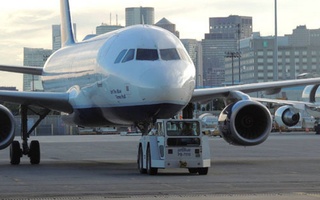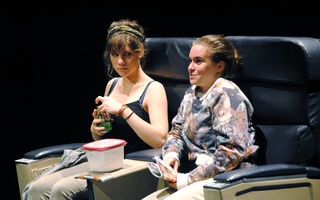By plane, Miami to Key West takes 45 minutes, a beautiful nonstop flight over sun-drenched, lake-drizzled swamp.
By Greyhound, the same trip takes five and half hours via highways and bridges, stopping at every large condominium and shopping center. Though nominally lined with palm trees, the route winds by more concrete buildings and fast-food restaurants than Route 1.
The prospect of bus travel seemed exciting enough. For only $30, as opposed to a $200 plane ticket, we could take a break from our Key West spring break for a weekend out on the town: Miami Beach. Five and a half hours later, amusement at our tour of the Keys' extensive resort and mall facilities was wearing a little thin. And while Miami was certainly worth the trip, our Greyhound adventure was surprisingly hard for me.
I am used to traveling by airplane; disconnected cities thousands of miles away seem, in effect, to be connected by magical tunnels of air. Visiting my relatives in Greece is a much shorter distance, culturally and physically speaking, than was driving south to small-town Illinois science competitions in high school.
Traveling by bus has the double effect of driving home not simply how large this country is--how many roads, exits, zip codes, gas stations and towns can fit in a finger's worth of map--but also how much exists between the familiar pieces, how much of the country I routinely do not experience. By plane, the world becomes a series of connected dots. I can move between the places I feel at home, or the places I want to go, passing over everything in between.
By plane, distance is trivial, unreal: it is simply the price, in units of time, to a destination. I get on the plane to Chicago, sleep or read for awhile, and I am home; it has cost me two hours. I get on the plane to Athens; it costs me nine. The comfortable, familiar nothingness of plane travel belies the complexity of life on the ground.
Travelling by bus was depressing, stagnant and--above all--boring. I say this because I'm spoiled, and because I have a short post-modern attention span, but most of all because I am used (on many levels) to mobility. Airplanes can't be credited for inventing the metaphor or the disengaged social critic, but there's a strong connection between our intellectual movement in the world and our physical experience of travel.
Why, for example, does activism seem so foreign to some students? Why does reading the newspaper not make us concretely angry? Why are discussion of social ideas over dinner more likely to end with invocation of Foucault than a concrete commitment to improving health care? Safe in the university, we are free to leap selectively between concepts, to stay in an intellectual airspace. The long, repetitive, quotidian ground in between--fighting the bill for three years through Congress, reforming welfare one family at a time--is not territory we need venture into.
Read more in Opinion
An Economic Plan for AfricaRecommended Articles
-
Record Crowds Jam All Rail, Air Facilities; Reservations Sold OutOnly opportunities for home going vacationers to find room in the over-crowded holiday transportation facilities are bus tickets, Northeast Airlines
-
Planes Grounded as Weather Slows All Rail, Highway TravelSnowstorms in Connecticut and other northeastern states snarled traffic last night as the Greyhound Bus Company announced that busses from
-
 Final Exam Schedule Posted
Final Exam Schedule Posted -
 Feldstein's Top Secret Economics Notes Left on an Airplane?
Feldstein's Top Secret Economics Notes Left on an Airplane? -
 "Air Travel" Soars to Success
"Air Travel" Soars to Success -
Three Cities, One WordI tell my students about the heartbreak of 2001, but I also speak of hope. That September I experienced the remarkable robustness of humanity.













